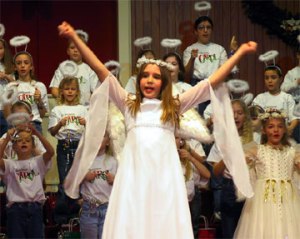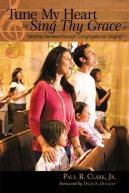 Christmas is such a powerful, miraculous moment in the Gospel story. Although it is beyond our human capacity to really comprehend, it is a core element of Christian faith, and thus a reason for singing. God came into the world as a human baby. Amazing! My dad was a Baptist pastor and my mom church organist, so I have grown up celebrating the significance of this season, and have been singing the carols since childhood. The music of Christmas has a special beauty and festive nature. The miraculous truth of God becoming one of us in order to save us despite all of the evil of our hearts, past, present, and future, deserves music that rings with joyous celebrative and triumphant spirit. As often as I have sung it, and as much as I have loved being part of music making in 2014, it never gets old. I found special joy in our family celebration as our six and seven year old grandchildren re-told the Christmas story in their own words with heartwarming detail. It gave me a sense of renewed hope that we were passing on the faith from generation to generation. After the kids told and acted out the story with a special manger scene made up of stuffed dolls, we sang carols. This is Christmas! In the midst of church pageants and singing Christmas tree presentations, Christmas Eve services, and family gatherings, we run out of words that can begin to capture the power of this miracle. I think that is a reason why I love the singing and music-making so much. Words of carols written by gifted poets help express our worship and praise. I also love reading and re-reading the writings of Church Fathers as they hammered out theological truth. Consider writings from Augustine on 1 John 1.
Christmas is such a powerful, miraculous moment in the Gospel story. Although it is beyond our human capacity to really comprehend, it is a core element of Christian faith, and thus a reason for singing. God came into the world as a human baby. Amazing! My dad was a Baptist pastor and my mom church organist, so I have grown up celebrating the significance of this season, and have been singing the carols since childhood. The music of Christmas has a special beauty and festive nature. The miraculous truth of God becoming one of us in order to save us despite all of the evil of our hearts, past, present, and future, deserves music that rings with joyous celebrative and triumphant spirit. As often as I have sung it, and as much as I have loved being part of music making in 2014, it never gets old. I found special joy in our family celebration as our six and seven year old grandchildren re-told the Christmas story in their own words with heartwarming detail. It gave me a sense of renewed hope that we were passing on the faith from generation to generation. After the kids told and acted out the story with a special manger scene made up of stuffed dolls, we sang carols. This is Christmas! In the midst of church pageants and singing Christmas tree presentations, Christmas Eve services, and family gatherings, we run out of words that can begin to capture the power of this miracle. I think that is a reason why I love the singing and music-making so much. Words of carols written by gifted poets help express our worship and praise. I also love reading and re-reading the writings of Church Fathers as they hammered out theological truth. Consider writings from Augustine on 1 John 1.
Life Itself Appeared in Human Form
from Augustine of Hippo’s commentary on the first letter of St. John, 5th Century
‘That which was from the beginning, which we have heard, which we have seen with our eyes and touched with our hands, concerning the Word of Life’. Who could touch the Word with his hands, were it not that the Word became flesh and dwelt among us?
This Word, who became flesh in order that he could be touched by hands, began to be flesh in the Virgin Mary’s womb. But he did not then begin to be the Word; for St John says, ‘That which was from the beginning’. See how his letter corroborates his gospel, from which you heard a short time ago, ‘In the beginning was the Word and the Word was with God’.
Possibly some may understand ‘concerning the Word of life’ as a vague expression referring to Christ, not meaning that very body of Christ which was touched by hands. But you must take into account what follow, ‘And life itself was made manifest’. It is Christ, therefore, who is the Word of life.
And how was life manifested? It was from the beginning, but it had not been manifested to men; yet it had been revealed to the angels, as they saw it and were nourished by it as if it were their bread. What does scripture say? ‘Man has eaten bread of angels’.
So the life itself was made manifest in the flesh, because it depended on ‘manifestation’, that a reality only perceptible to the heart might also be visible to our eyes, and thus heal our hearts. For the Word is seen only by the heart, but the flesh is seen also by bodily eyes. There was in fact flesh which we could see, in order to heal the heart, the means by which we could see the Word.
‘And we are witnesses’, he says, ‘and proclaim to you the eternal life, which was with the Father and was made manifest among us’; to make the text clearer it is permissible to read ‘was made manifest to us’.
‘That which we have seen and heard therefore we proclaim to you’. My dear brethren in Christ, take note of this: ‘that which we have seen and heard therefore we proclaim to you’. They – namely the writers – saw the Lord himself, present in the flesh and heard the words from the Lord’s own lips, and proclaimed them to us. So we also have heard, but we have not seen.
Is it to be concluded that we are less blessed than those who heard and also saw? How then does the writer add, ‘that you say have fellowship with us’? They saw, we have not seen; and yet we are in fellowship with them, for we hold a common faith.
‘And our fellowship is with God the Father and with his Son Jesus Christ. And’, he adds, ‘we are writing this that you joy may be complete’. This complete joy of which he speaks is in that very fellowship itself, in that very love, in that very unity.
Augustine article from www.swordofthespirit.net



